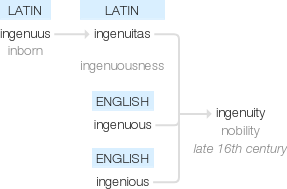Ingenuity
late 16th century (also in the senses ‘nobility’ and ‘ingenuousness’): from Latin ingenuitas ‘ingenuousness’, from ingenuus ‘inborn’. The current meaning arose by confusion of ingenuous with ingenious.
wiktionary
From Latin ingenuitās.
etymonline
ingenuity (n.)
1590s, "honor, nobility," from French ingénuité "quality of freedom by birth" and directly from Latin ingenuitatem (nominative ingenuitas) "condition of a free-born man," figuratively "frankness, generosity, noble-mindedness," from ingenuus "frank, candid, noble" (see ingenuous).
Etymologically, this word belongs to ingenuous, but in 17c. ingenious "intellectual, talented" and ingenuous so often were confused (even by Shakespeare) that ingenuity in English has come to mean only "capacity for invention or construction." That sense of this word is first attested 1640s; the word for it in Middle English was ingeniosity (the native word is craftiness). French ingénuité, meanwhile, has evolved through "natural and graceful freedom of manners" to "graceful simplicity" (compare ingenue); for the sense "ingeniousness," French uses ingéniosité.
